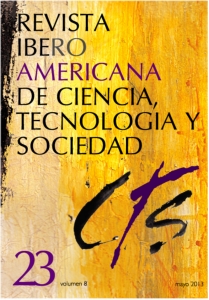Urban-regional territories as a means of innovation
San Luis, Argentina: a citizens’ laboratory?
DOI:
https://doi.org/10.52712/issn.1850-0013-647Keywords:
knowledge society, citizens’ labs, public policies, educationAbstract
The paper is a critical reflection on the results of three successive field researchs (2008-2009, 2009-2010 and 2011-2013) that study the scope program impacts of the San Luis Digital program (SLD) in Argentina, sponsored by the provincial government of San Luis, with the participation of the University of La Punta, technology companies and non-governmental organizations (NGOs). The question that guides this work is the following: Is the province of San Luis a large-scale citizens’ laboratory? This study is exploratory and boasts a qualitative- quantitative approach. It includes several activities: a documentary study of theories and good international practices that illustrate the impact of ICT on the uses and habits of citizens; the development of indicators of qualitative and quantitative assessment; a sample design of populations and individuals; different field works (two trips to each location) and the subsequent processing of information. Outcomes and impacts were studied over the whole province, through interviews with members, participants and beneficiaries of SLD. This paper concludes that the province of San Luis can be considered a large-scale citizens’ laboratory where the proactive participation of citizens in the innovation process is planned for the short term.
Downloads
References
BOASE, J.; HORRIGAN, J. B.; WELLMAN, B. y RAINIE, L. (2006): “The Strength of Internet Ties. The internet and email aid users in maintaining their social networks and provide pathways to help when people face big decisions”, Pew Internet and American Life Project, Washington D.C. Disponible en: http://homes.chass.utoronto.ca/~wellman /publications/index.html.
CASTELLS, M. (2000): “La Ciudad de la Nueva Economía”, La Factoría, nº 12.
FINQUELIEVICH, S. y PRINCE, A. (2010): “El desarrollo de una provincia Digital”, San Luis, Universidad de La Punta. Disponible en: http://www.ulp.edu.ar/comunicacion /libros_ulp/desarrollo/files/libro.pdf.
FINQUELIEVICH, S. (2007): La innovación ya no es lo que era: Impactos meta- tecnológicos en las áreas metropolitanas, Buenos Aires, Dunken.
FINQUELIEVICH, S. (2007): “Iniciativas para acceder a la Sociedad de la Información. Sistemas sociales de respuesta a necesidades de conectividad”, en S. Finquelievich, D. Finquelievich y E. Kaufman (eds.): Políticas Públicas y tecnologías, Buenos Aires, La Crujía.
FINQUELIEVICH, S.; ROZENGARDT, A.; DAVIDZIUK, A. y Finquelievich, D. (2010): National Information Society Policies: A Template, UNESCO. Disponible en: http://portal.unesco.org/ci/en/files/29360/12602731983IFAP_Template_en.pdf/IFAP_ Template_en.pdf.
OUDSHOORN, N. y PINCH, T. (2003): How Users Matter. The Co-construction of Users and Technology, Cambridge, MIT Press.
ROGERS, E. (1995): Diffusion of Innovations, Nueva York, The Free Press.
SCHUMPETER, J. (1935). Análisis del cambio económico. Ensayos sobre el ciclo económico, México D.F, Fondo de Cultura Económica. Disponible en: http://eumed.net/cursecon/textos/schump-cambio.pdf.
SCHULER, D. (1996): New community networks. Wired for Change, Reading, Addison-Wesley.
WELLMAN, B. (2004): “Connecting Community: On- and Offline”, Contexts, vol. 3, nº 4, pp. 22-28. Disponible en: http://homes.chass.utoronto.ca/~wellman/publications/.
Downloads
Published
How to Cite
Issue
Section
License
Copyright (c) 2024 CC Attribution 4.0

This work is licensed under a Creative Commons Attribution 4.0 International License.
All CTS's issues and academic articles are under a CC-BY license.
Since 2007, CTS has provided open and free access to all its contents, including the complete archive of its quarterly edition and the different products presented in its electronic platform. This decision is based on the belief that offering free access to published materials helps to build a greater and better exchange of knowledge.
In turn, for the quarterly edition, CTS allows institutional and thematic repositories, as well as personal web pages, to self-archive articles in their post-print or editorial version, immediately after the publication of the final version of each issue and under the condition that a link to the original source will be incorporated into the self-archive.











